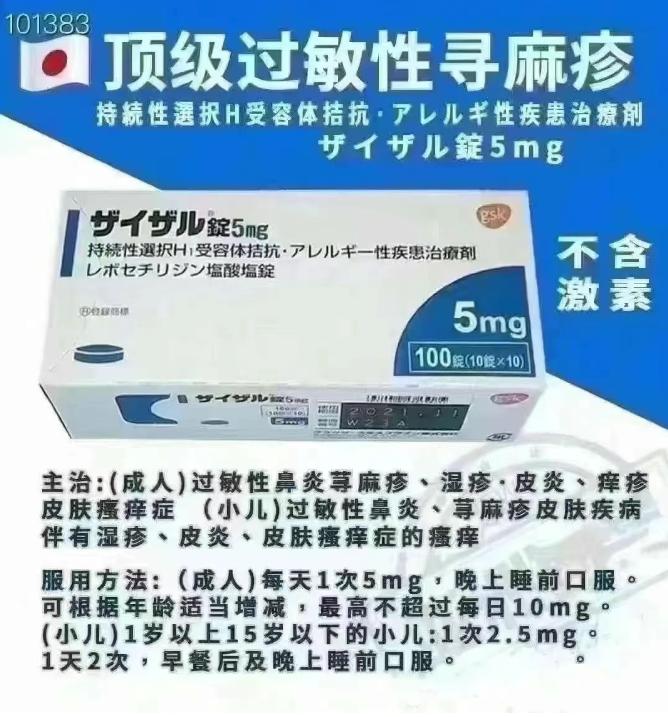
GSK Premium Antiallergy Xyzal (Levocetirizine Dihydrochloride) 5mg Tablets – 100 Tablets
Recommended Household Medicine from Japan | Xyzal (Levocetirizine) 5mg — A Potent Antihistamine for Chronic Urticaria and Allergies
With environmental changes and faster-paced lifestyles, the incidence of allergic diseases is continuously rising, affecting many people who suffer from conditions like rhinitis and urticaria. Japan, as a leading country in allergy drug development, offers the highly effective and low side-effect medication “Levocetirizine” (brand name: Xyzal) produced by Mitsubishi Tanabe Pharma. It has become a top choice for many families and healthcare professionals. This article will provide a detailed introduction to the drug’s ingredients, efficacy, dosage, and precautions to help users take medicine scientifically and live healthily.
1. Product Overview
Levocetirizine is the active enantiomer of cetirizine, a long-acting and highly selective histamine H1 receptor antagonist. It works by blocking histamine from binding to H1 receptors in the body, thereby suppressing various allergic symptoms such as:
Skin itching and urticaria
Nasal congestion, sneezing, and runny nose (as seen in allergic rhinitis)
Eye itching and tearing (symptoms of allergic conjunctivitis)
2. Specifications
Package: 100 tablets (10 tablets per blister pack × 10 packs)
3. Appearance
White film-coated tablets with double-sided score marks
4. Ingredients
Active Ingredient:
Each tablet contains 5 mg of Levocetirizine Hydrochloride as the main active component. Levocetirizine selectively blocks histamine H1 receptors to relieve symptoms such as nasal congestion, runny nose, sneezing, skin itching, and urticaria caused by allergies.
Excipients (Additives):
To ensure stability, compressibility, taste, and disintegration of the tablets, the following excipients are included:
Microcrystalline Cellulose: filler and binder to improve tablet strength
Light Anhydrous Silicic Acid: anti-caking and flow aid
Lactose Hydrate: diluent for proper tablet size and ease of swallowing
Magnesium Stearate: lubricant to prevent powder sticking during compression
Hypromellose (HPMC): film coating agent to control drug release and enhance stability
Titanium Dioxide: white pigment and light blocker to protect the drug
Polyethylene Glycol 400: plasticizer to improve coating flexibility and texture
5. Indications
Adults:
Allergic rhinitis
Urticaria, eczema, dermatitis, prurigo, and other itching skin conditions
Children:
Allergic rhinitis
Urticaria and itching associated with skin diseases such as eczema, dermatitis, and prurigo
6. Dosage and Administration
Adults:
Typically, 5 mg of Levocetirizine Hydrochloride once daily orally before bedtime. Dosage can be adjusted based on age and symptoms but should not exceed 10 mg per day.
Children (7 to under 15 years old):
Typically, 2.5 mg twice daily orally, after breakfast and before bedtime.
7. Precautions
General:
This medication may cause drowsiness; patients should avoid driving or operating machinery during treatment.
If no improvement is observed, avoid prolonged, aimless use and consult a healthcare provider for treatment adjustment.
For Allergic Rhinitis:
For seasonal allergic rhinitis, it is advisable to start treatment just before the high-risk season and continue until the season ends for better control and prevention.
8. Adverse Reactions
Serious but Rare:
Shock and anaphylactic reactions (frequency unknown): symptoms may include breathing difficulty, low blood pressure, urticaria, and redness.
Convulsions (frequency unknown)
Liver dysfunction (approximate incidence 0.6%) and jaundice (frequency unknown): may present with elevated AST, ALT, γ-GTP, LDH, ALP, accompanied by fatigue, loss of appetite, fever, nausea, and possible jaundice.
Thrombocytopenia (frequency unknown): watch for unexplained bleeding or bruising.
9. Contraindications
Patients with a known hypersensitivity to any components of this drug or to piperazine derivatives (such as cetirizine or hydroxyzine).
Patients with severe renal impairment (creatinine clearance less than 10 mL/min).
